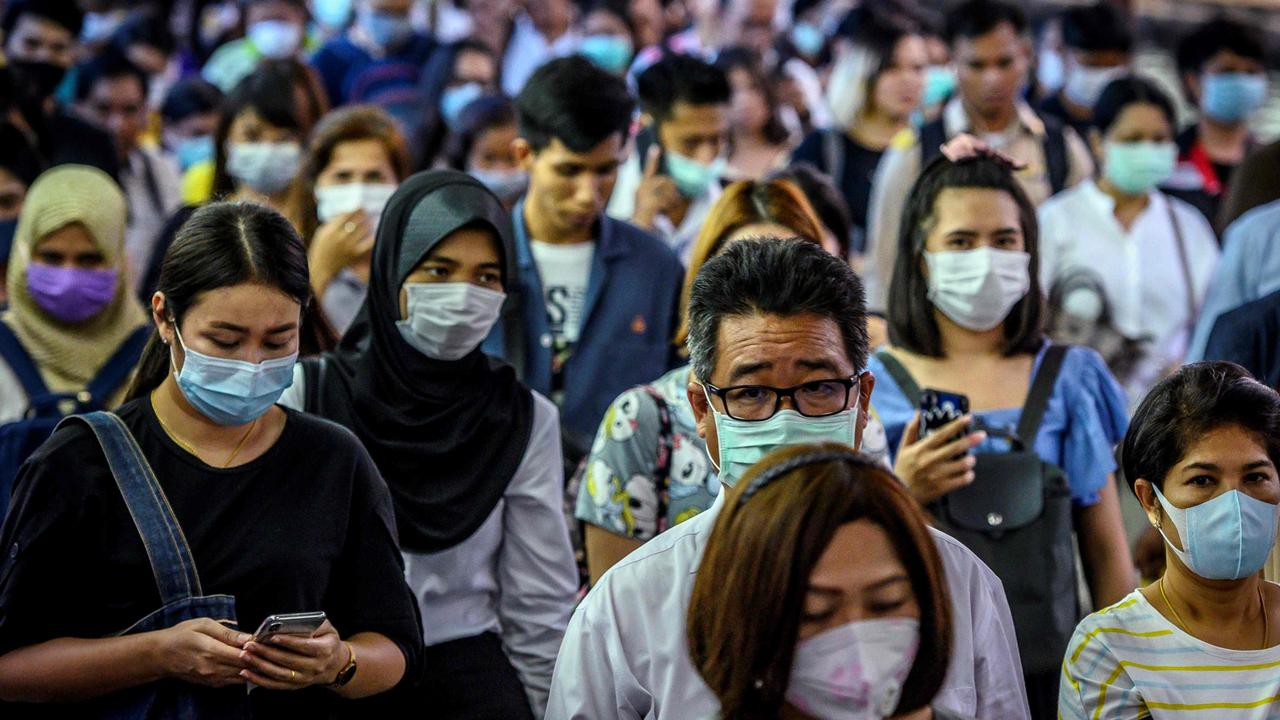How does coronavirus spread?
As coronavirus cases in both Australia and abroad increase, scientists have discovered more information about how the disease is spread.

As coronavirus cases in both Australia and abroad increase, and a global pandemic being declared becomes more likely, Aussies are being urged by the government and authorities to prepare for the worst.
The deadly COVID-19 has spread to more than 60 countries, and with Australia’s first human-to-human cases confirmed, chief medical officer Professor Brendan Murphy said an outbreak was now likely, staying “it’s no longer possible to absolutely prevent new cases coming in”.
However, University of Queensland virologist Professor Ian Mackay said Aussies still have some time to prepare before a pandemic hits.
“We can be a little bit ahead of that curve and we've still got plenty of time because the virus isn’t spreading widely here yet,” Professor Mackay told the ABC.
While there are still plenty of questions about coronavirus that scientists are seeking to answer, here’s what they know about how the disease is transmitted.
RELATED: Follow the latest coronavirus updates
RELATED: One thing that could stop virus spread
HOW DOES CORONAVIRUS SPREAD?
COVID-19 is not an airborne disease like measles, and is instead spread via direct contact with respiratory droplets, which we generate when we sneeze or cough.
The disease is transmitted when a person who is infected coughs or exhales, and small droplets land on objects and surfaces around them.
Other people then catch the virus by touching these objects and surfaces, and then touching their eyes, nose or mouth.
You can also catch coronavirus if you breathe in droplets from someone who is infected who coughs or exhales out – which is why, according to the World Health Organisation (WHO), it’s important to stay more than a metre away from a person who is sick.
While some Australians were worried about contracting the virus from parcels being sent from China, or walking past someone who was sick, Australian deputy chief medical officer Professor Paul Kelly said they shouldn’t be concerned. You cannot get the virus from parcels, and passing someone was “virtually totally safe”.
VIRUS CAN BE SPREAD BEFORE SYMPTOMS APPEAR
Evidence has suggested that coronavirus can be spread before symptoms even appear.
“We are now sure that there is a possibility that people can transmit this virus before they become symptomatic,” Professor Kelly said.
“This is quite a change in what we understand about the virus and it has led to some different ways that we are dealing with the public health issues but I do want to reassure the Australian public, this is a very precautionary measure.”
Director of America’s National Institute of Allery and Infectious Diseases, Dr Anthony Fauci, told The New York Timesthat it was important to find out how much of a role asymptomatic carriers were playing in the spread of coronavirus.
“I don’t think there’s any question that someone who is without symptoms and carrying the virus can transmit the virus to somebody else,” Dr Fauci said.
“The question is, how prevalent is that phenomenon? Is that becoming an important driver of the outbreaks, or is it an unusual occurrence?”
Only screening people with symptoms of the virus may mean new cases are being missed.
“Normally, you don’t screen asymptomatic healthy people for the virus because it’s too expensive,” Dr Sandra Ciesek, from the Institute of Medical Virology at University Hospital Frankfurt, said.
“This shows we might have more infected people already all over the world than we expect.”
RELATED: Should you wear a coronavirus face mask?

SHOULD YOU BE WEARING A MASK?
Surgical face masks have become the most sought-after accessory of 2020, leading to sold out shelves across the world and inflated prices online.
However, experts have stressed they should only be worn by people who are already sick, or by health professionals when doing things like taking swabs from sick patients.
“We don’t recommend the masks for general use,” Professor Ramon Shaban, from the University of Sydney and Western Sydney Local Health District told news.com.au.
The WHO’s director-general Tedros Adhanom Ghebreyesus said he’s concerned the worldwide supplies of protective equipment is being disrupted due to virus fears.
“We are concerned that countries’ abilities to respond are being compromised by the severe and increasing disruption to the global supply of personal protective equipment, caused by rising demand, hoarding and misuse,” he said.
It’s more important to practice good hand hygiene, said Professor Shaban, who explained that if you don’t clean your hands properly and then rub your eyes, mouth or nose, this can actually pass on the infection even if you do have a mask on.
“Masks are not the great answer people think they are,” he said.
The WHO said that those who are sick can wear a mask if they are coughing and sneezing, but they are “effective only when used in combination with frequent hand-cleaning with alcohol-based hand rub or soap and water”.
“If you wear a mask, then you must know how to use it and dispose of it properly.”
WHO also said that before putting on a mask, strict hygiene rules should be followed including cleaning hands with alcohol-based hand rub or soap and water.
“Cover mouth and nose with mask and make sure there are no gaps between your face and the mask,” it said.
SYMPTOMS TO LOOK OUT FOR
The most common symptoms of COVID-19 are fever, tiredness and dry cough, according to the WHO, and can take up to 14 days to develop. Some people may also experience aches and pains, nasal congestion, runny nose, sore throat or diarrhoea.
Anyone who has been to China or Iran, or in contact with a person infected with coronavirus, should immediately isolate themselves from other people.
And if they start to experience symptoms, they should phone their GP or local emergency department.
RELATED: Steps you must take to avoid killer virus
ADVICE FROM HEALTH AUTHORITIES
• Regularly and thoroughly clean your hands with an alcohol-based hand rub or wash them with soap and water.
• Avoid close contact with anyone who has a fever or cough.
• Avoid touching eyes, nose and mouth.
• Make sure you, and the people around you, follow good respiratory hygiene.
• Stay home if you feel unwell.
• If you develop a fever, cough and difficulty breathing, seek medical advice promptly.
• Stay informed on the latest developments about COVID-19.



